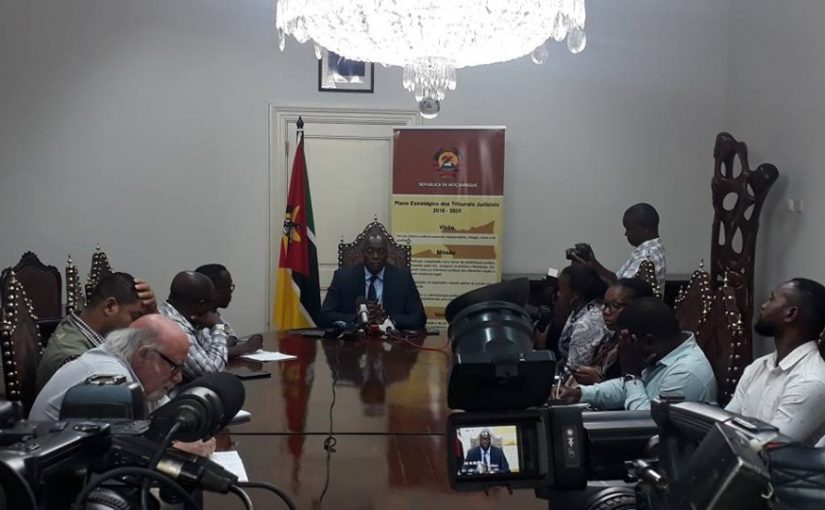Mozambique: Government says "very intensive" investigation into kidnapping of Portuguese ...
Mozambique elections: Only 58 appeals to district courts against proceedings in polling stations – AIM report

Photo: CIP Eleições
Despite their claim that the general and provincial elections held in Mozambique on 15 October were a “mega-fraud”, neither of the two main opposition parties, Renamo and the Mozambique Democratic Movement (MDM), made any complaint to the courts about events in the vast majority of polling stations.
Thanks to an amendment to the electoral legislation passed in 2014, at the insistence of Renamo, irregularities or frauds at the polling stations should be protested, within 48 hours, to the nearest district court. To make appeals easier, this year the requirement that a complaint must be made first to the polling station staff themselves was abolished.
But, according to Supreme Court spokesperson Pedro Nhatitima, speaking at a Maputo press conference on Tuesday, in the entire country there were only 58 appeals to the district courts against proceedings in polling stations. 41 of these were in Nampula province, 13 in Maputo province and four in Sofala.
In the other eight provincial constituencies there was not a single appeal against any decision by staff at any polling station, and no protest against any of the results sheets (“editais”). Hence there were no opposition appeals to the courts against anything that happened in most of the 20,162 polling stations.
There are many, well-attested instances of polling station staff breaking the law – by, for example, expelling Renamo or MDM monitors from the polling stations. In such instances, Nhatitima said, the individuals concerned or their parties should have immediately contacted the district court.
“That’s why the courts were open 24 hours a day during the election period”, he said. Yet no party took advantage of this, and not a single case of the harassment or expulsion of Renamo or MDM monitors or MMVs (polling station staff) entered any district court.
The situation might change: Nhatitima said the information he was giving was preliminary. Not all data from all the courts had yet reached Maputo.
He said that, of the 58 appeals submitted to the courts, 55 were rejected – either because they were submitted beyond the 48 hour deadline, or because they were not accompanied with any evidence. Two cases are awaiting an opinion from the local branch of the Public Prosecutor’s Office, and one was “partially accepted”.
This concerned a results sheet from Mecuburi district, in Nampula. Renamo protested that the sheet showed 876 votes, when in reality only 292 people had voted.
In six cases, the parties concerned (mostly Renamo) are appealing to the Constitutional Council, the country’s highest body in matters of constitutional and electoral law. In one of these cases, Renamo claimed that, in the northern port of Nacala, staff had deliberately invalidated Renamo votes (by adding extra marks to the ballot paper, to make it look as if the voter had tried to vote for more than one candidate).
Renamo also pointed to numerical inconsistencies in various results sheets. But the Nacala city court, Nhatitima, said rejected the appeal on the grounds that it made no difference to the final result. This seems a very dubious decision, given that the difference in votes between Frelimo and Renamo in Nacala is only 630.
In addition to the appeals (“recursos”, in Portuguese), the district courts also held trials in cases of criminal offences (“ilicitos”).
There were 464 criminal cases, but 272 (58.6 per cent) concerned the relatively minor offence of destroying the campaign posters of opposing parties.
There were 52 cases of causing disturbances at polling stations, 44 cases of people who allegedly voted more than once, and 21 cases of attempted ballot box stuffing.
Nhatitima said that12 people have been convicted of attempts to introduce extra votes into the ballot boxes, six were acquitted and three are awaiting trial.
As for the disturbances at polling stations, most of those accused (44) were acquitted while the remaining eight were found guilty. Two of the people who tried to vote multiple times, were sentenced, one was acquitted, and the other 41 cases are awaiting trial.
116 people were sentenced for damaging election propaganda, 90 were acquitted, and 66 are awaiting trial.
Taking all the election crimes together, 162 people were convicted, 169 were acquitted and 133 are awaiting trial. Nhatitima did not break these figures down by the political party allegiance of those accused.
Nhatitima said that sometimes opposition parties had not understood the difference between an electoral crime and an appeal – they had, for example, appealed against cases of people voting twice. But this is a clear crime, and was being treated as such by the courts.












Leave a Reply
Be the First to Comment!
You must be logged in to post a comment.
You must be logged in to post a comment.